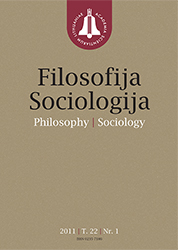Gydytojų socialinis mobilumas transnacionalinėje socialinėje erdvėje
Physicians’ social mobility in transnational social space
Author(s): Anna LipnevičSubject(s): Social Sciences
Published by: Lietuvos mokslų akademijos leidykla
Keywords: physicians’ profession; social mobility; transnationalism; transnational social space; migration
Summary/Abstract: Physicians’ profession is undoubtedly considered one of the most important professions not only to the individual, but also to groups of individuals (state, region and the entire world). On the other hand, not every region or country doctor may have the necessary equipment for work, strong auxiliary staff support, development opportunities and so on. For these and other reasons, some physicians decide to leave their homeland, and migration becomes a channel for rapid social mobility. Importance of transnational social space is growing due to various factors such as the speed changes of geographical distance overcoming, political decisions, social network development, economic differences between countries and so on. The article aims to deliver the research results of physicians’ social mobility in transnational social space. The main objectives of the study are to review transnational social space concepts, to reveal the main trajectories of doctors’ territorial mobility in the European region, to highlight the circumstances mitigating and aggravating physicians’ social mobility between countries. The study objectives were achieved combining quantitative and qualitative research methods, scientific literature and statistical data analysis. Transnational social space is a complex macro-level social phenomenon, which is formed by transmigrants connecting national social spaces into a single whole. To summarize, the results of analysis of scientific literature suggest that transnational social mobility is intra-generational individual’s social status changes in the horizontal or vertical direction in transnational social space structure. Physicians’ preparation is a lengthy and costly process for each state. For economically weaker countries it is hard to compete in the area attracting doctors or maintenance. Major physicians ‘donors’ countries of the European region still are the former Soviet bloc (including Lithuania) and the Mediterranean countries. Therefore tensions between the countries, which lose their doctors, and the countries, which adopt doctors, require drastic reforms, especially in planning. Each country should be responsible for planning the number of doctors, rather than to compensate physicians’ lack by ‘importing minds’. The state, which ‘exports minds’, should not drastically increase the scale of medical training, but must initiate restructuration of transnational space. If it is a small country, it should forge alliances and work together with allies providing solutions for transnational governance institutions in medical human resource issues.
Journal: Filosofija. Sociologija
- Issue Year: 2013
- Issue No: 2
- Page Range: 71-81
- Page Count: 11
- Language: Lithuanian

